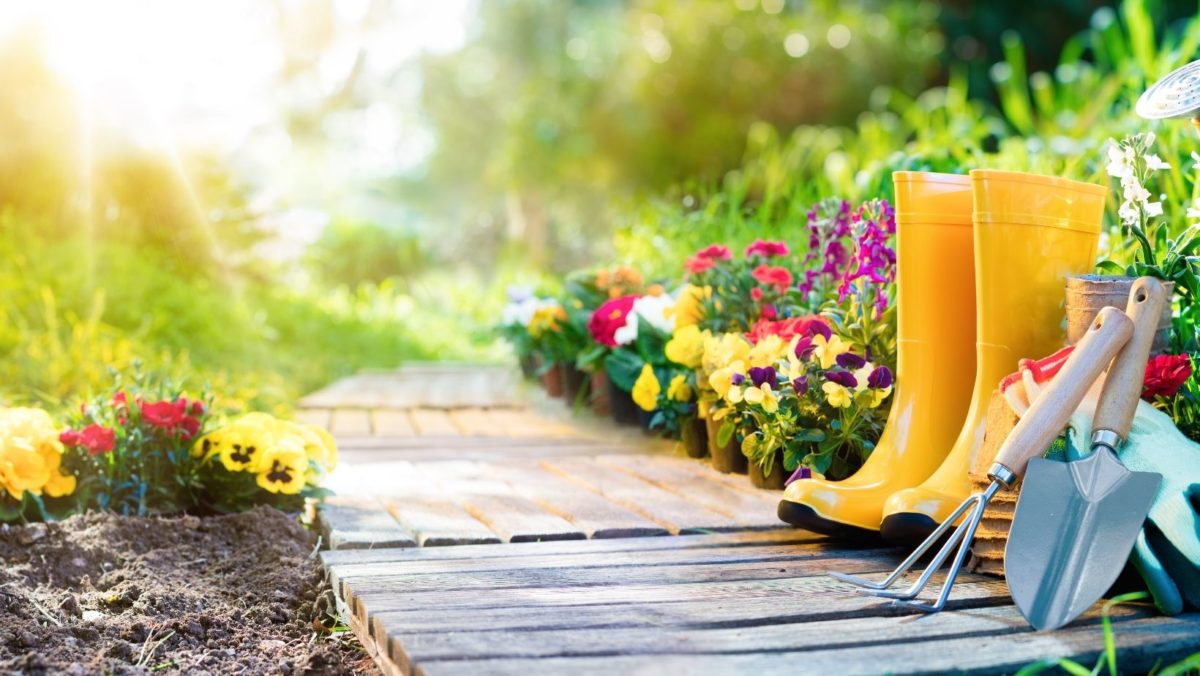
There’s no question that growing a garden is an enjoyable hobby, but the benefits go far beyond a fun pastime. Tending to your plants provides numerous mental, physical, and emotional health benefits, no matter what age you are. You may think certain medical and physical challenges will prevent you from gardening later in life. But with a little planning and creativity, you can create a gardening space that’s safe, accessible, and enjoyable. Let’s take a look at the benefits of growing a garden at home and why it’s never too late to start.
Cultivating a garden not only brings immediate joy, but also fosters hope and a positive outlook for the future, as you nurture growth and look forward to what lies ahead.
Why It’s Never Too Late to Start a Garden
There are so many creative ways to adapt your garden space to reduce physical stress on your body. With a little planning and ingenuity, these strategies will allow you to garden for as long as you like, even if you have medical or physical restrictions.
- Garden indoors using a system for vertical farming that allows you to avoid the elements and the need to till the soil, pull weeds, or bend over to tend your plants.
- Create a container garden with window boxes and planters on your porch or patio that’s easy to manage and tend.
- Make garden beds and have the beds built at waist height so you don’t have to bend down. Tending to garden beds can provide gentle physical activity, help exercise different muscle groups, and support mental wellbeing.
- Things like retracting hanging baskets and containers on wheels can be used to create planting spaces that are moveable and easy to access.
- Look for lightweight gardening tools that are easier to use and have foam handles for a better grip.
- Use an umbrella to provide shade in your workspace when it’s hot outside.
- Invest in a rolling gardening stool so you can sit down while you garden.
- Use a drip irrigation system for watering and fertilizing your plants to reduce labor input.
Creating your own garden allows you to tailor the space to your needs and preferences, giving you personal control and the benefits of enjoying your own garden.
The Benefits of Gardening and Growing at Home
Whether you’re considering a vertical indoor gardening space, a patio garden, or a raised bed garden, there are lots of benefits to growing at home. Growing your own food offers improved health, greater sustainability, and a direct connection to what you eat. Growing food at home can also be a rewarding and educational experience. Here are just a few of the advantages you can look forward to as you tend your plants on a daily basis.
1. Growing at Home Is Good for the Environment
Many of us are concerned about the effects of high-intensity agriculture on the environment. Growing at home allows you to move away from conventionally grown produce and reduce your carbon footprint.
Sustainable gardening practices help mitigate climate change by reducing carbon emissions from food production and transportation. Gardens and trees are a major contributor to a green environment, improving air quality and supporting ecosystems. Even a single maple tree in your garden can trap pollutants, remove carbon from the atmosphere, and help fight climate change.
Gardening allows you to compost to reduce waste, avoid the use of harmful chemicals, and utilize rain barrels to cut down on water waste. You can choose to use manual or electric tools instead of gas-powered ones or even turn your yard into a welcoming wildlife habitat.
2. Gardening Promotes a Healthier Diet
There’s nothing like eating a garden-fresh tomato, picking your own fruit, or cooking with herbs, vegetables, and other healthy foods you grew right on your kitchen windowsill or in your backyard. Growing your own fruits and vegetables not only gives you access to nutrient-rich produce, but also encourages better food choices and supports a healthy food lifestyle. The satisfaction and educational value of harvesting your own food, such as tomatoes and sweet potatoes, helps foster healthy eating habits for you and your family. Home gardening allows you to enjoy foods with higher nutrient content, supporting a balanced diet and making it easier to include more fruits and vegetables in your daily meals.
3. Being Outdoors is Good for the Immune System
It turns out humans are a lot like plants. The human body utilizes its own form of photosynthesis using the sun to create vitamin D. Of course, you don’t want to overdo it, but a little sunshine goes a long way. Spending just thirty minutes in the sun can allow your body to produce a full day’s supply, which not only strengthens the immune system and your bones, it also lowers your risk of chronic diseases like cancer, dementia, and diabetes.
Sunlight lowers blood pressure and supports cardiovascular health, making time outdoors especially beneficial. Spending time in the garden can help maintain healthy vitamin D levels, which in turn lowers blood pressure and reduces the risk of cardiovascular disease.
4. Gardening is Good for Your Physical Health
Gardening is a great exercise. It is a form of physical activity and moderate intensity exercise that builds physical strength, helps you maintain a healthy weight, and supports good sleep. Tasks like digging in the ground, raking, and tending to garden beds work different muscle groups and can help reduce muscle tension. Whether you’re raking leaves or pulling weeds, gardening can work every muscle group in the body.
5. It’s Good for Your Brain, Too
You’re probably heard that exercise is a fantastic way to support cognitive function and improve memory. But there’s also evidence that gardening may promote the growth of memory-related nerves in the brain. Gardening also allows you to watch both your garden and your cognitive skills develop over time. And that’s not all! Research also shows that gardening can improve the mental health of folks suffering from dementia.
6. Gardening Reduces Anxiety, Depression, and Stress
Gardening is an amazing mood and self-esteem booster that can reduce stress and contribute to improved mental health. Spending time in the garden regularly calms the mind, lowers stress levels, and reduces anxiety and depression. Growing a garden actually lowers the level of stress hormones in the body, which boosts the mood and returns it to a more positive state.
7. Gardening Promotes Creativity and Mindfulness
Growing a garden at home allows you to be creative, whether you’re planning your layout, deciding which plants to put together, or coming up with ways to maximize your space. Gardening is also a lot like meditation. It encourages mindfulness, focus, and being in the present moment.
8. Gardening Can Promote Interaction and Community
Gardening with your spouse, grandkids, or at a community garden promotes interaction and community. Participating in community gardens offers the added benefits of sharing seeds and gardening knowledge with others, fostering social connections, and supporting local food systems. Working toward a common goal and sharing your knowledge and successes helps you form new relationships, boosts self-esteem, and promotes a sense of wellbeing. For some, this benefit alone makes gardening enjoyable.
Safety Tips to Keep in Mind
- Read the labels on garden products carefully. Some products, even organic ones, can be dangerous if applied incorrectly.
- Wear protective clothing when you’re using sharp tools, including long pants, gloves, goggles, close-toed shoes, and gloves.
- Wear bug spray, sunscreen, and a hat.
- Take frequent breaks and stay hydrated to prevent overheating.
- Listen to your body. If hauling bags of mulching or pulling weeds is too much, ask for help. It’s not worth injuring yourself and being stuck in bed while you recover.
The Bottom Line: Growing at Home is Good for You
The bottom line is gardening encourages you to be active and interact with people who have similar interests. It allows you to be proactive about exercise and eating a healthy diet in beautiful surroundings. Gardening has a positive impact on health, diet, and mental well-being, offering a range of benefits that support overall wellness.
Gardening builds physical strength, promotes a healthy weight, helps you sleep better, and it’s good for your mental and physical health. Whether your garden is a few pots on the windowsill or several raised beds in the backyard, tending plants is good for you, and it’s never too late to start.
Do you enjoy gardening or would you like to begin a garden? Let’s chat in the comments at the bottom of this page.

About the author: Nicole has been obsessed with beauty and fashion since she was a young girl, always flipping through Vogue and stealing her mother’s cosmetics bag to experiment. She’s a former wedding makeup artist who loves spending her free time trying new products and staying up to date on the latest beauty and style trends. While Nicole’s days are now spent contributing to fashion, beauty, and lifestyle sites from home while raising her kids, she can still always be found putting looks together, even if it’s just for a trip to the grocery store!
If you enjoyed this article on growing a garden at home, please subscribe. You will get each daily story delivered straight to your inbox.

* This blog contains affiliate links that give Honey Good a small commission.

+ show Comments
- Hide Comments
add a comment